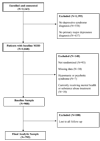Remission in major depression: results from a geriatric primary care population
- PMID: 21157850
- PMCID: PMC3049170
- DOI: 10.1002/gps.2485
Remission in major depression: results from a geriatric primary care population
Abstract
Objectives: While a recent task force report recommended that remission from major depression be defined according to DSM criteria, most previous work has used depressive symptom rating scales. The current study sought to identify baseline factors associated with treatment outcome in major depression, diagnosed according to DSM-IV criteria.
Methods: Data from the Primary Care Research in Substance Abuse and Mental Health for the Elderly (PRISM-E) study were utilized. This analysis focused on 792 geriatric primary care patients with major depression at baseline, which was randomized to services by a mental health professional in primary care or specialty settings. Major depression was diagnosed according to DSM-IV criteria based on a structured interview at baseline and 6 months. The primary outcome was the absence of any DSM-IV depressive disorder at six-month follow-up. Association with baseline demographic characteristics, comorbid anxiety disorder, 'at risk' drinking, number of co-occurring medical conditions, and depressive symptom severity was examined using multiple logistic regression modeling.
Results: Remission occurred in 228 (29%) patients with completed follow-up assessments, while 564 (71%) did not remit. Factors which increased the odds of non-remission included comorbid anxiety (OR=1.60, 95% CI 1.11-2.31), female sex (OR=1.49, 95% CI 1.04-2.15), general medical comorbidity (OR=1.15, 95% CI 1.07-1.24), and increased baseline depressive symptom severity (OR=1.04, 95% CI 1.03-1.06).
Conclusions: The findings underscore the importance of using DSM criteria to define remission from major depression, and suggest that concurrent measurement of depression severity, comorbid anxiety, and medical comorbidity are important in identifying patients requiring targeted interventions to optimize remission from major depression.
Copyright © 2010 John Wiley & Sons, Ltd.
Conflict of interest statement
Figures
References
-
- Alexopoulos GS, Meyers BS, Young RC, et al. Executive dysfunction and long-term outcomes of geriatric depression. Arch Gen Psychiatry. 2000;57:285–290. - PubMed
-
- American Psychiatric Association. Diagnostic and Statistical Manual of Mental Disorders. 4th Ed. Washington: American Psychiatric Press; 2000. (DSM-IV-TR)
-
- Andreescu C, Lenze EJ, Dew MA, et al. Effect of comorbid anxiety on treatment response and relapse risk in late-life depression: controlled study. Br J Psychiatry. 2007;190:344–349. - PubMed
-
- Areán PA, Ayalon L, Jin C, et al. Integrated specialty mental health care among older minorities improves access but not outcomes: results of the PRISMe study. Int J Geriatr Psychiatry. 2008;23:1086–1092. - PubMed
Publication types
MeSH terms
Grants and funding
LinkOut - more resources
Full Text Sources



